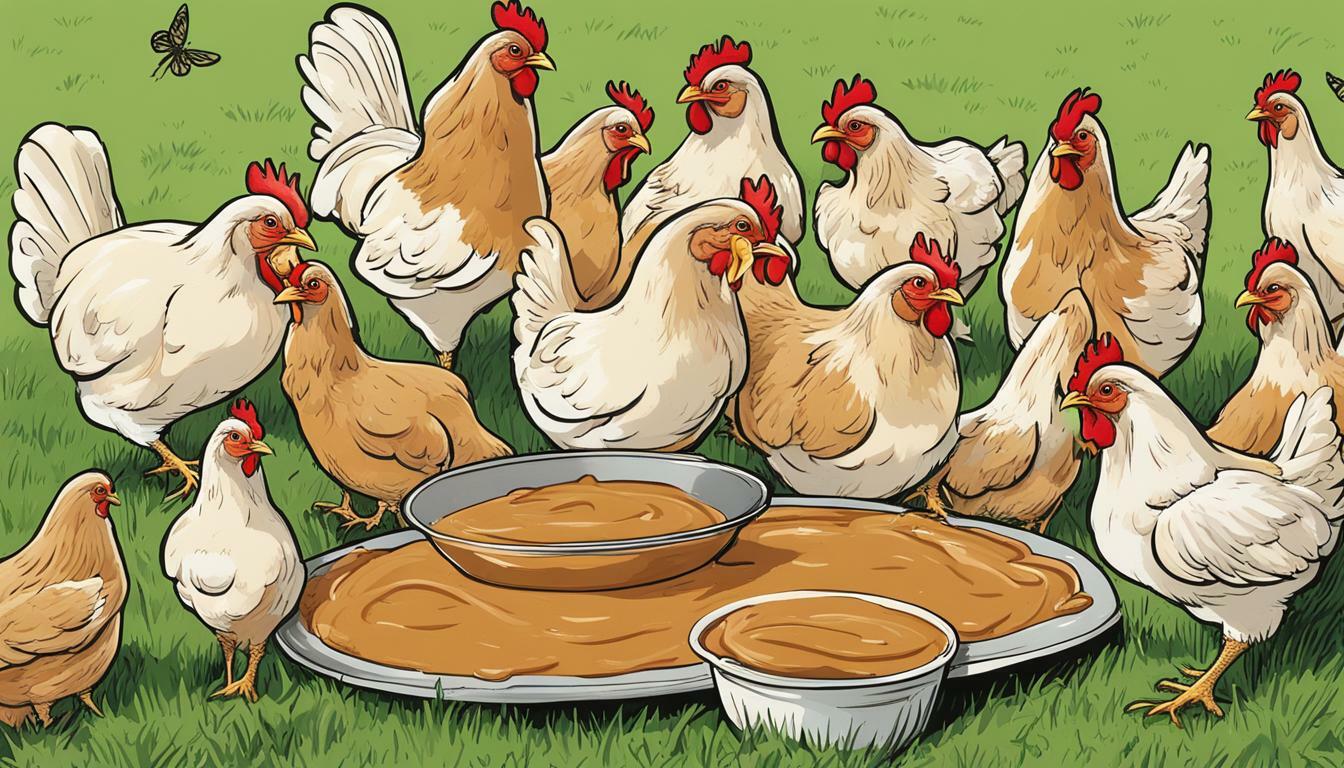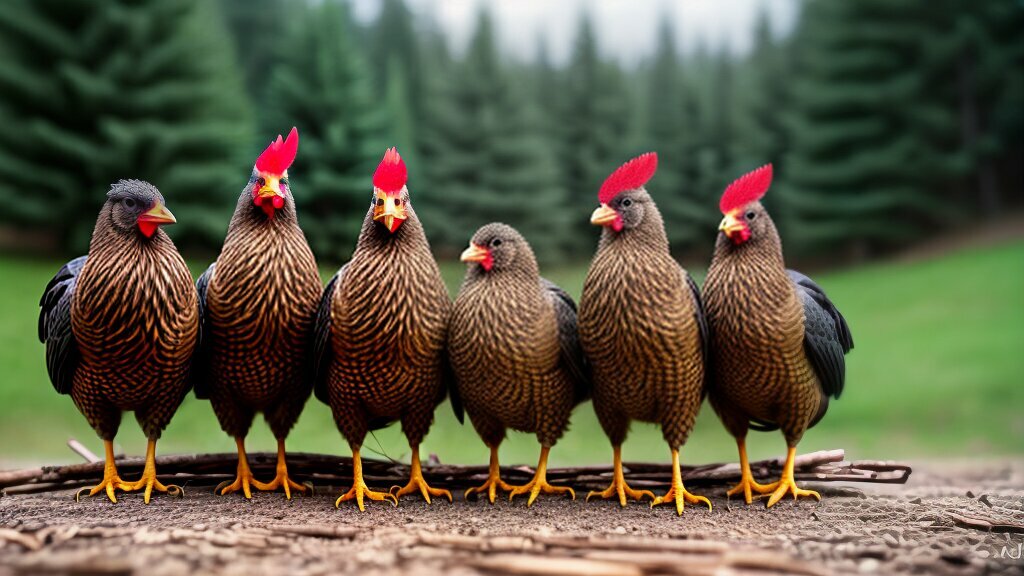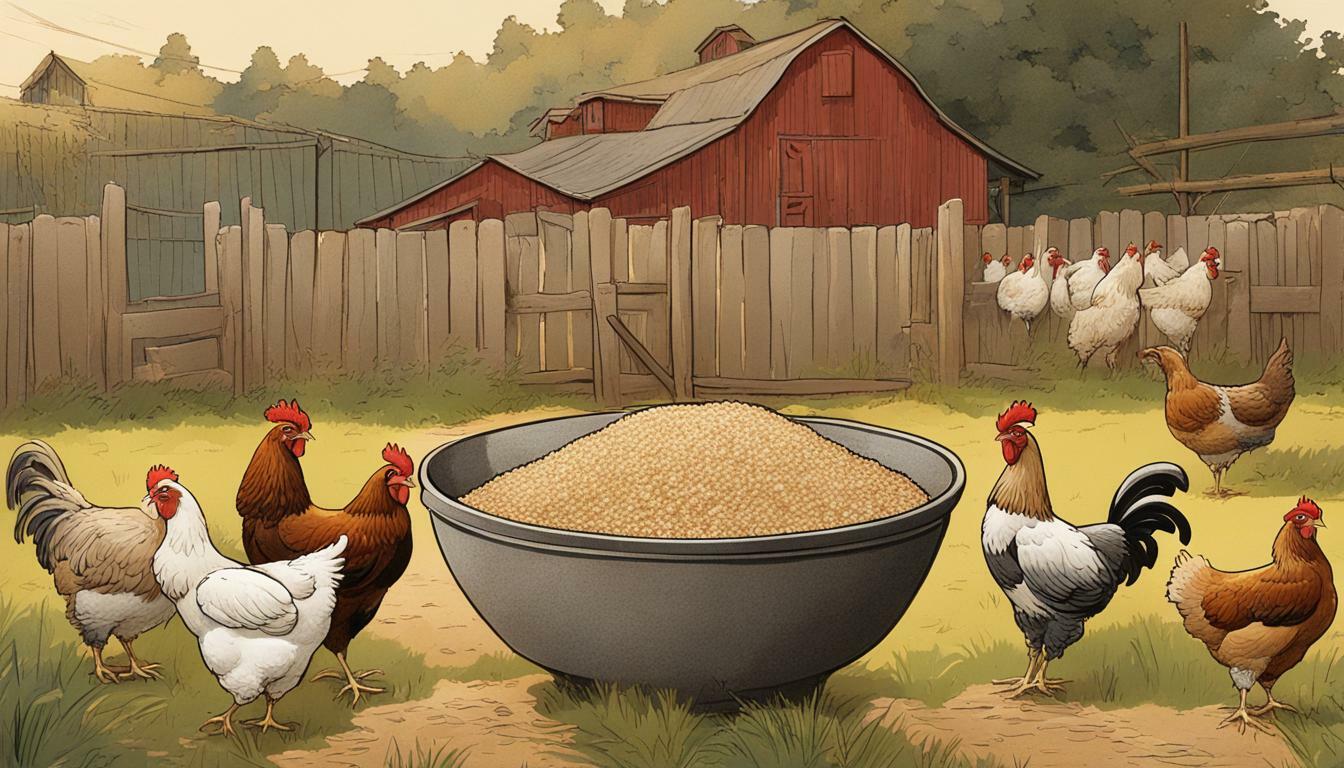Can Chickens Eat Turkey Feed? Find Out the Answer Here!

Table of content:
- Is Turkey Feed Bad for Chickens?
- What Happens If You Feed Chickens Turkey Feed?
- Why Can’t Chickens Eat Turkey Feed?
- Will Chickens Get Sick from Turkey Feed?
- Do Chickens Like Turkey Feed?
- Is It Okay to Mix Chicken and Turkey Feed?
- How Much Protein is in Turkey Feed for Chickens?
- Will Turkey Feed Make Chickens Fat?
- Can You Feed Chickens Layer Pellets and Turkey Feed?
- Final Thoughts
This is a common question for chicken owners who may also have turkeys or access to turkey feed. The short answer is yes, chickens can eat turkey feed, but there are some important considerations.
Is Turkey Feed Bad for Chickens?
Turkey feed is not necessarily bad for chickens. However, there are some key differences between chicken and turkey feed that mean turkey feed should not make up the entire diet of a chicken.
Turkey feed tends to have higher protein and fat levels, as well as different vitamin and mineral contents tailored to the nutritional needs of growing turkeys. Chickens have different requirements, especially laying hens.
What Happens If You Feed Chickens Turkey Feed?
Feeding chickens turkey feed occasionally as a supplement or treat will not harm them. However, feeding turkey feed as the main diet can cause the following problems:
- Weight gain – The higher fat and protein in turkey feed may lead to obesity in chickens.
- Nutritional deficiencies – Chickens may not get enough calcium, phosphorus or other nutrients needed for egg laying on a turkey feed diet.
- Egg production drop – Lack of nutrients and excess weight gain can cause a drop in egg production for laying hens.
- Vent gleet – The higher fat content in turkey feed can lead to this disease around the vent area in chickens.
So feeding turkey feed as the sole diet is not recommended. But supplementing or mixing it with chicken feed in moderation is okay.
Why Can’t Chickens Eat Turkey Feed?
Chickens can technically eat turkey feed, but should not eat it exclusively or long term. This is because of the nutritional differences between chickens and turkeys:
- Turkeys grow much larger than chickens, so turkey feed has higher protein for muscle growth. Excess protein in chicken diets can cause damage.
- Turkeys also convert feed to fat at a higher rate, so turkey feed has higher fat. Excess fat can cause obesity and liver problems in chickens.
- Laying hens need more calcium for eggshell production than turkeys do. Turkey feed does not provide optimal calcium.
- The vitamin and mineral balance is tailored for turkeys and their nutritional needs, not chickens.
Chicken feed is specially formulated to give chickens the right nutrition for their stage of life and purposes, whether for egg laying, meat production, or as pets.
Will Chickens Get Sick from Turkey Feed?
Eating turkey feed occasionally will not make chickens sick. However, relying on it long term can increase the risk of certain health problems:
- Obesity – Excess fat can cause fat deposits in the liver and abdomen.
- Nutritional deficiencies – Lack of calcium, phosphorus and other minerals over time.
- Egg binding – Not enough calcium causes thin shells and egg binding.
- Impacted crop – Too much fat or fiber can cause crop impactions.
- Vent gleet – The high fat content can lead to this rear-end infection.
- Fatty liver hemorrhagic syndrome – Potentially fatal in hens on high fat diets.
So while turkey feed itself is not toxic, the resulting nutritional imbalances can make chickens ill over time. Moderation is key.
Do Chickens Like Turkey Feed?
Chickens tend to enjoy the taste of turkey feed as an occasional treat. Here’s why:
- It has a higher fat content, which improves palatability.
- The protein content is higher, including fish meal, which chickens find very appealing.
- It contains more added sugars like molasses to sweeten the taste.
- The texture is often softer than chicken feed pellets.
- It provides some variety from their usual diet.
Think of turkey feed as the occasional sweet treat or “junk food” for chickens. They may love the taste, but it should not make up the bulk of their regular diet. Moderation is key.
Is It Okay to Mix Chicken and Turkey Feed?
It’s fine to mix some turkey feed in with the regular chicken feed in moderation. Here are some tips:
- Limit turkey feed to 10% or less of the total feed mix.
- Slowly transition over several weeks when introducing it.
- Provide a calcium supplement if feeding laying hens.
- Watch for signs of obesity or loose droppings.
- Avoid feeding to young chicks under 16 weeks old.
- Never feed medicated turkey feed intended to prevent blackhead disease.
Mixing a small amount provides some variety. But too much can lead to nutritional issues over the long term.
How Much Protein is in Turkey Feed for Chickens?
The protein content in turkey feed can vary by brand and formula, but tends to range from:
- 24-28% protein for turkey starter feeds.
- 26-32% protein for turkey grower feeds.
- 16-24% protein for turkey layer feeds.
By comparison, chicken feed formulas contain:
- 18-22% protein for chicken starter feeds.
- 16-20% protein for chicken grower feeds.
- 14-18% protein for chicken layer feeds.
So turkey feeds tend to run 4-6% higher in protein than similar chicken feeds. This is because young, growing turkeys require very high protein levels to support their rapid muscle growth to large sizes.
Excessively high protein can be harmful to chickens over the long term. That’s why chicken feeds are formulated with their protein needs in mind.
Will Turkey Feed Make Chickens Fat?
Feeding too much turkey feed long term can lead to obesity in chickens. Here are some reasons why:
- Turkey feed has higher fat content, usually around 3-5% versus 1-3% in chicken feed. This extra fat can get deposited as excess internal and abdominal fat.
- The higher protein in turkey feed also contains fat as a byproduct. Excess protein gets converted to fat in the chicken’s body.
- The added sugars in turkey feed for taste also get converted to fat.
- Turkeys are genetically prone to higher fat gain than chickens. Their feed is formulated for their needs.
To prevent obesity, limit turkey feed to occasional treats or a small supplemental amount in the overall diet. Monitor chickens for weight gain if feeding.
Can You Feed Chickens Layer Pellets and Turkey Feed?
It’s okay to feed laying hens some turkey feed along with their layer pellets, but there are some important considerations:
- Make sure the laying feed provides enough calcium – at least 3.5-4.5%.
- Supplement with oyster shell if needed.
- Limit turkey feed to 10% or less of the total feed.
- Slowly transition over 2-3 weeks when introducing.
- Watch for signs of reduced egg production.
- Monitor weight and droppings closely.
- Avoid feeding to pullets under 16 weeks old.
With attention to the hen’s nutrition and health, small amounts of turkey feed can add variety without disrupting laying. But the layer feed should make up the majority of their diet.
Final Thoughts
Chickens can safely eat small amounts of turkey feed as an occasional treat or supplement. But it should never make up the bulk of their diet long term. With some care and monitoring, limited turkey feed can add some variety without causing health issues. Be sure to feed proper chicken feed tailored to their life stage and purpose for optimal nutrition.
Welcome. I’m Adreena Shanum, the proud owner of this website, and I am incredibly passionate about animals, especially poultry. I founded adreenapets.com as a labor of love, stemming from my desire to share my knowledge and experiences with poultry enthusiasts worldwide.




